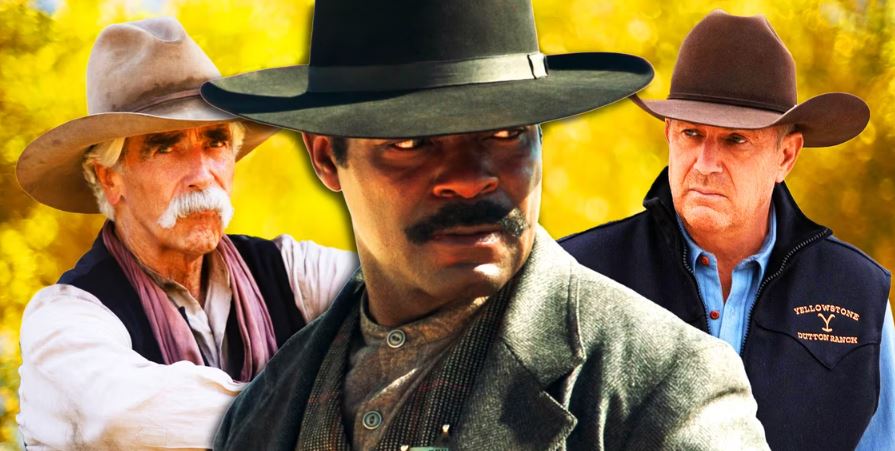Taylor Sheridan’s latest Western series Lawmen: Bass Reeves has been criticized for its deviations from the historical accounts of the real-life Old West lawman Bass Reeves. The Paramount+ series started off as a close depiction of Bass Reeves’ true story from being born a slave, fighting in the Civil War for the Confederacy against his will, and his monumental rise as one of the first black Deputy U.S. Marshals in American history. During the latter half of the season, however, Lawmen: Bass Reeves took on a more dramatized and serialized approach that rewrote some parts of Reeves’ true legend.
The Lawmen: Bass Reeves ending features an entirely fictional showdown between Bass Reeves (David Oyelowo) and the mythical cannibalistic slave catcher Mr. Sundown (Barry Pepper). While the addition of Mr. Sundown made for intriguing moral and religious dilemmas between Bass and Mr. Sundown, the series chose to focus on a completely fabricated story rather than dive into some of the real-life parts of Bass Reeves’ legend. With over 3000 arrests credited to Bass Reeves in his 30+ years in law enforcement, it seems like there were certainly other historically accurate narrative avenues and enemies for Lawmen: Bass Reeves to dramatize.
Lawmen: Bass Reeves Was Originally Rumored To Be An 1883 Spinoff (Why It Isn’t)
Taylor Sheridan had much less involvement than originally thought

There were initial indications before the release of Lawmen: Bass Reeves that the show was developed as a spinoff to the Yellowstone prequel 1883. While this information may have been misreported, there are some apparent signs within Lawmen: Bass Reeves that point to Sheridan’s potential plan to overlap the worlds of 1883 and Lawmen: Bass Reeves. The real-life Bass Reeves’ career as a Deputy U.S. Marshal began in 1875 at Hell on the Border jail in Fort Smith, Arkansas. Bass would go on to serve in the Western Arkansas district, including Indigenous Territory (modern-day Oklahoma) until he was transferred to Eastern Texas in 1893.
Because of this apparent overlap in 1883 and Lawmen: Bass Reeves’ timelines, there was great speculation that the two Sheridan-produced series would be a part of the Yellowstone universe. This was later reported not to be accurate by Lawmen: Bass Reeves showrunner Chad Feehan, who explained that the series would be entirely separate from 1883 and Yellowstone and would only chronicle Bass Reeves’ life up until 1877. Sheridan, who was originally thought to be one of the writers and directors of the series, ended up having much less involvement and oversight than originally thought.
Two Major Events In Lawmen: Bass Reeves Actually Happened In 1884, Not 1877
Bass Reeves killed Jim Webb & William Leach in the same year

One of the best parts about Lawmen: Bass Reeves existing outside the Yellowstone universe was that it didn’t have to alter the real-life legend of Bass Reeves in order to fit in with the events and timeline of 1883. While that type of crossover would have potentially been entertaining, Lawmen: Bass Reeves began with the promise of being closely accurate to the true story of the Old West icon, which is interesting enough that it didn’t really need to be changed. When Lawmen: Bass Reeves diverted from the true story and went into the realm of historical fiction during the middle of its season, the show lost one of its best features.
Two critical events during Lawmen: Bass Reeves, which were mostly glossed over to push forward the narrative of Mr. Sundown, actually took place in 1884. Bass Reeves’ true rivalry with Jim Webb ended with Bass finally killing him in 1884. That same year, Bass killed his posse cook William Leach, which he went on trial for in 1886. While both events were briefly depicted and dramatized in Lawmen: Bass Reeves, they took place in the year 1877 rather than 1884. This points to the idea that Lawmen: Bass Reeves could have been developed with the intention of 1883 overlap since both of these true life events could have fit into the Yellowstone prequel’s timeline.
Lawmen: Bass Reeves Being In Yellowstone’s Universe Would Explain Its Historical Inaccuracies
The fictionalization of Bass Reeves would make sense if it were connected to 1883
The historical inaccuracies in the latter half of Lawmen: Bass Reeves would have been more justified if the series was actually a part of the Yellowstone and 1883 universe. Since Lawmen: Bass Reeves showrunner Chad Feehan made it clear that there is no official overlap, the reasoning for why the series went from essentially being a biopic to a complete historical fantasy is much more difficult to grasp. Historical inaccuracies in Lawmen: Bass Reeves would have been expected if the Old West lawman was to somehow cross paths with the characters of 1883. Since this isn’t the case, it’s harder to understand why the series rewrote parts of Bass Reeves’ amazing true story.
